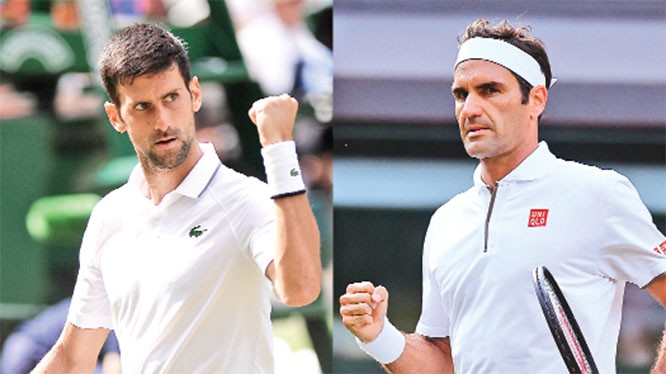
But, on the brink of his 38th birthday, Federer will go all out to beat Djokovic, who has won three of the past four majors. While it might be a tough ask, the Swiss maestro would not pick any other stage for that particular task than the Centre Court at Wimbledon

It might have narrowly fallen short of the 2008 and 2007 finales, but the Fedal semifinal on Friday brought us all the ingredients that have made the Federer-Nadal rivalry the most venerated in all of tennis.
The match itself could’ve swung either way, but the Swiss maestro’s dominance from the middle of the third set to the middle of the fourth set proved to be decisive, along with an almost perfect first set tie-break.
What makes Federer’s win even more special is that his age-old nemesis Nadal was playing some of his finest grass court tennis. Even in the semifinal, it wasn’t the Spaniard who saw his level come down, the Swiss was just that much better - crucially, and intriguingly, even in the long baseline rallies, where Nadal has traditionally been dominant.
As discussed in this space last week, it would’ve been the Grand Slam upset of the decade had anyone other than Federer, Nadal or Novak Djokovic won the Wimbledon this year.
Fittingly, the Big Three, the top three ranked players in the world, and for many the three greatest male tennis players of all time, were the last three remaining in the tournament after Djokovic dispatched Roberto Bautista Agut in four sets in the first semifinal.
Federer’s epic win over Nadal has now set up a mouthwatering finale with Djokovic: the third Wimbledon final that the pair would contest after having played the 2014 and 2015 deciders. It promises to be another classic, and will be a tough match to call. But the Serb might have the edge, to repeat his wins from 2014 and 2015.
Djokovic, the defending champion, has a 2-1 head to head lead over Federer at Wimbledon, having lost the 2011 semifinal against the Swiss. In recent years, it’s Djokovic who has dominated the matchup. Federer has one win over Djokovic in the past six matches, two in the past 10 - this span has included wins in the finals of Wimbledon (2015), US Open (2015) and the semifinal of the Australian Open in 2016.
However, Djokovic’s dominance in recent years, which has taken his head to head lead over Federer to 25-22 has largely been based on the matches from 2014 to 2016 - which were the Serb’s peak years, while the Swiss wasn’t quite matching his all-time loftiest standards.
For context, Djokovic had completed the Nole slam - holding all four majors at the same time - from Wimbledon 2015 to Roland Garros 2016, while Federer didn’t win a major between Wimbledon 2012 till the Australian Open 2017.
After that four-and-a-half year barren spell, Federer won three majors in 12 months - Australian Open 2017-18 and Wimbledon 2017 - and became the oldest ATP No 1 in history.
While Djokovic did win both his matches against Federer in 2018 - Cincinnati Masters and Paris Masters - today’s final will be the first Grand Slam match between the two since the Swiss’ return to major-winning ways in 2017.
In many ways, post-2017 has seen Federer’s late resurgence, where he has tweaked his game to a point where he has returned to Grand Slam success. Among other things, Federer seems to have solved the decade old Nadal puzzle as well.
The question now is, on the brink of his 38th birthday, can Federer beat Djokovic, who has won three of the past four majors? While it might be a tough ask, Federer would not pick any other stage for that particular task than the Centre Court at Wimbledon.
If Federer can play at the level he did against Nadal on Friday, he would have a great chance. However, the challenge for each of the Big Three over the past decade has been to beat the other two greats in back to back matches to win majors.
That’s why it has only been achieved thrice - Nadal at Roland Garros in 2007 and 2008, when he beat Djokovic in the semifinal and Federer in the final on both occasions; and Djokovic in 2011, when he beat Federer in the semifinal and then Nadal in the final.
With Nadal doing it on clay twice, and Djokovic on hard, is it now Federer’s turn to win back to back matches against his Big Three rivals to win the major on his preferred surface?
Fatigue will play a factor as well. Even though the Fedal semifinal didn’t go to five sets, it was a long battle that would’ve taken a lot out of the second seed, who confessed that he was "exhausted" in the immediate aftermath of the contest.
Hence, the strategy for Federer would be straightforward: go all guns blazing from the get go, and hope to get the decisive control over the final in the first couple of sets.
Djokovic, meanwhile, knows that he needs to be at his solid best to keep Federer at bay. He returns Federer’s serve on grass better than anyone has ever done, and if the return game is on for the Serb, he would be tough to beat.
Either way, with Federer looking for his 9th Wimbledon and 21st major, and Djokovic looking for his 5th Wimbledon and 16th major, two of the greatest of all time are all set to give us another classic at SW19.